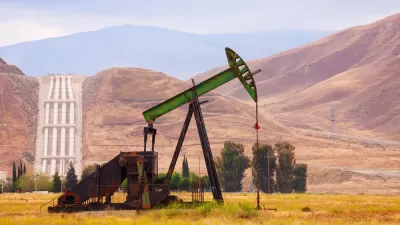What was the extent of the environmental damage caused by leaking oil wells during September's flood? Turns out, it depends on whom you ask. Word from both government and the industry is that it was minimal, while environmental advocates disagree.
Oil production has increased 64% since 2010 in Colorado. In June, 2013, it was ranked #9 among all states in oil production according to the EIA. It was inevitable that the mid-September floods would affect the industry and thus affect the environment. Jack Healy reports on the damage caused by leaking wells and how it's being viewed by government, industry, and environmental advocates.
While "(i)mages of toppled oil tanks and dark sheens on the water created impressions of an environmental calamity, state officials say the damage appears to be limited. About 37,380 gallons have spilled so far — an amount, energy officials point out, that would fill up about five percent of an Olympic-size swimming pool", Healy writes.
Tisha Conoly Schuller, president of the Colorado Oil and Gas Association, an industry group, puts in this way: “In the context of hundreds of billions of gallons of rain, and millions of gallons of raw sewage, 37,000 gallons is pretty small.”
But environmental advocates point out that "the groundwater, soil and rivers may now be stained by oil, and they have criticized state regulations that allowed drilling pads to be set alongside rivers and streams in the first place", Healy writes.
"The flood plain is just littered with oil and gas wells, and this exemplifies what a huge mistake that was,” said Gary Wockner, the Colorado program director of Clean Water Action.
Gov. John W. Hickenlooper, a Democrat and former oil geologist, appeared to side with the energy industry, "saying a relatively small amount of oil had spilled. State officials have pointed out that the flooding had also released other contaminants as it surged through industrial areas, feed lots and sewer systems." Hickenlooper rejected environmentalists' calls to "halt drilling and assess damage".
“Given the power of this flood, the fact that there hasn’t been that much leakage is incredible,” Mr. Hickenlooper said on a recent tour of the spill area.
The boom in oil drilling in Colorado has also swelled the ranks of citizen and environmental activists wary of the controversial practice of fracking. Already, the conservative city of Longmont passed a ban on fracking (though declared unconstitutional). The real test comes this fall when "voters in at least five other communities in Colorado will face ballot questions on whether to ban or temporarily outlaw fracking", writes Healy.
FULL STORY: After the Floods in Colorado, a Deluge of Worry About Leaking Oil

Planetizen Federal Action Tracker
A weekly monitor of how Trump’s orders and actions are impacting planners and planning in America.

Map: Where Senate Republicans Want to Sell Your Public Lands
For public land advocates, the Senate Republicans’ proposal to sell millions of acres of public land in the West is “the biggest fight of their careers.”

Restaurant Patios Were a Pandemic Win — Why Were They so Hard to Keep?
Social distancing requirements and changes in travel patterns prompted cities to pilot new uses for street and sidewalk space. Then it got complicated.

Platform Pilsner: Vancouver Transit Agency Releases... a Beer?
TransLink will receive a portion of every sale of the four-pack.

Toronto Weighs Cheaper Transit, Parking Hikes for Major Events
Special event rates would take effect during large festivals, sports games and concerts to ‘discourage driving, manage congestion and free up space for transit.”

Berlin to Consider Car-Free Zone Larger Than Manhattan
The area bound by the 22-mile Ringbahn would still allow 12 uses of a private automobile per year per person, and several other exemptions.
Urban Design for Planners 1: Software Tools
This six-course series explores essential urban design concepts using open source software and equips planners with the tools they need to participate fully in the urban design process.
Planning for Universal Design
Learn the tools for implementing Universal Design in planning regulations.
Heyer Gruel & Associates PA
JM Goldson LLC
Custer County Colorado
City of Camden Redevelopment Agency
City of Astoria
Transportation Research & Education Center (TREC) at Portland State University
Camden Redevelopment Agency
City of Claremont
Municipality of Princeton (NJ)



























